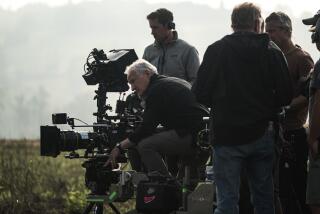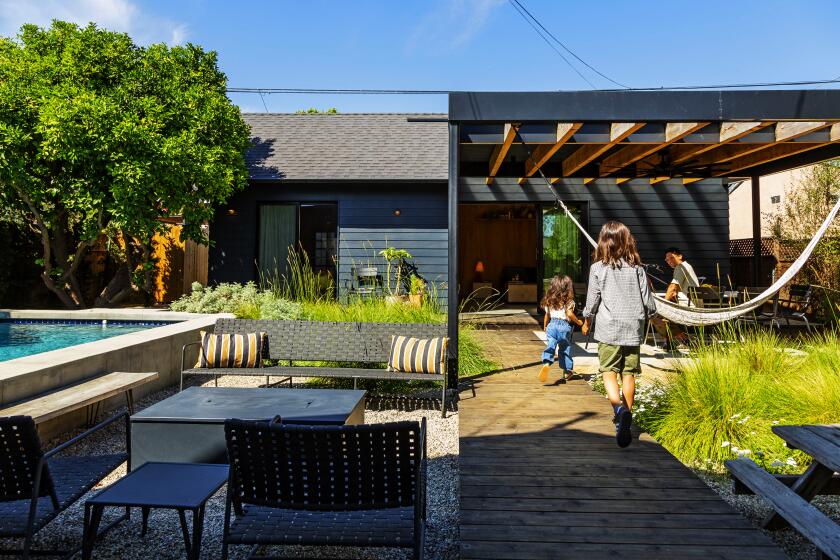Violinist Taking Final Juilliard Bow
- Share via
NEW YORK — Robert Mann is not retiring.
Yes, the 76-year-old violinist is leaving the job he has had for half a century as front man for the Juilliard Quartet, but he has plenty of plans. There are concertos to perform, books to write and pieces to compose. “I have about six works I’ve been trying to finish because I can’t get any momentum,” he says, tilting back in his metal chair in a studio at the Juilliard School, his burly frame packed into a flannel work shirt.
“Also,” he adds, as if to remind himself, “I really do want to do more things with my wife.”
Momentum is one thing it’s difficult to imagine Mann being without. He talks just as he plays, energetically and unstoppably, his voice as gravelly, powerful and idiosyncratic as his famously intense violin tone. The Juilliard Quartet, which has seemed like an extension of his personality ever since he founded it 50 years ago, has always been known for interpretations that combined restless energy with a sense of structure. Similarly, Mann’s sentences roll into paragraphs, and his digressions return to the topic like a piece of music that wanders through distant harmonic areas before modulating back to the home key.
But even a long, tumultuous string quartet must conclude eventually, and, because of both age and the chronic Lyme disease that has made playing painful at times in recent years, Mann’s professional association with the Juilliard--which more than any other such group has shaped the chamber music world in the United States--will end this summer. Tonight’s sold-out concert at UCLA’s Schoenberg Hall will be his last California appearance with the quartet. (He returns Feb. 16 to perform with the Robert Mann Players--including his son and daughter-in-law--at the Mission Inn in Riverside.)
His final appearance with the ensemble will be July 2 at Tanglewood’s Berkshire Music Festival in Lenox, Mass. On Aug. 6 at Tanglewood second violinist Joel Smirnoff slides over a chair, Ronald Copes, a former member of the Los Angeles Piano Quartet and professor at UC Santa Barbara, takes Smirnoff’s place and Mann launches his new careers. (He will remain on the Juilliard faculty as co-chair of the violin department.)
The books he’s got in mind will deal with “20th century American musical culture”--memoirs, in other words. After all, Mann has been around for about a third of the history of American concert life, taught several generations of American string quartets and helped build for his students a nation of avid listeners.
“If you’ve taught for 50 years,” Mann calculates, just before his first violin student of the day arrives, “and you influence 50 to 100 people a year, that’s . . . a lot.”
Among the ensembles that coalesced under his tutelage or whose members studied with the Juilliard Quartet are the Tokyo, Emerson, Concord and Brentano quartets. The LaSalle Quartet was named for the street where Mann was living when the group was formed in his living room.
*
Bobby Mann was a cocky young musician from Portland, Ore., in 1946, already a Naumburg Award winner but not yet demobilized from the Army Signal Corps, when he heard that Juilliard president and composer William Schuman was looking for a quartet to be in residence at the school. Mann and his friend, cellist Arthur Winograd, decided to secure the job first and form the group later.
“Bill said, ‘Tell me, if I were to hire you, will it be the greatest quartet in the world?’ ” Mann reminisces in an account that has become string quartet legend. “I said, ‘I can’t guarantee it will be the greatest, but it will certainly be one of them.’ ”
And so it has been. Violist Samuel Rhodes, who joined the group in 1969, still remembers the pang of jealousy he felt in high school when a friend bragged that he had a ticket to hear the Juilliard Quartet. “If someone had told me that I was going to play with them some day,” Rhodes says, “that would have been as if someone had said you’re going to be center fielder for the New York Yankees.”
From the beginning, the Juilliard Quartet’s style combined a New York edge with Mann’s natural vigor and his love for brambly contemporary music. “We didn’t want to have smooth chamber music,” Mann says, as if agreeing with critics who have complained for 50 years that the Juilliard sound is electric but abrasive. “If Bartok wrote ruvido [rough], we wanted to sound ruvido.”
Stature came slowly for the quartet. Neither chamber music--which was still considered an esoteric, connoisseur’s art--nor the composers the group championed, such as Schoenberg and Elliott Carter, were an easy sell. But for Mann and his colleagues (there have been nine over the years), playing the chamber music of their own time was a matter of personal belief, and the intensity of their style was inherent in the works that helped shaped it.
“The best way to describe Robert Mann,” Rhodes says, “is in terms of the Carter Second String Quartet”--an intricate, mercurial piece, in which each of the four parts seems to follow its own logic, as in a hopelessly tangled argument. “The first violin has the most dynamic role in that he assumes the most variety of characters and is constantly changing. A strong reason why the [Juilliard] has evolved is that Robert never wants to leave anything the way it was.”
Copes, whose relationship with the Juilliard has, until recently, been purely that of a fan, agrees. “The quartet sounds different than it did 30 years. Even Bobby Mann sounds different.”
One thing, though, hasn’t changed for Mann, and that is his devotion to the demanding, highbrow music he came of age with. Indeed, Mann says his deepest regret about leaving the Juilliard is that he will never play Carter’s recent Fifth Quartet with the group--though he is thinking about forming another ensemble for that purpose.
In public, he will admit only to an attenuated melancholy over cutting his lifelong ties to the Juilliard Quartet, but his simile is telling: “It’s like a fulfilled love,” he says. “When one person dies and it’s over, you grieve, but not with the same quality as if you haven’t been fulfilled.”
* The Juilliard Quartet’s performance at Schoenberg Hall, UCLA, today, 8 p.m., is sold out. The Robert Mann Players appear Feb. 16 at the Mission Inn, Riverside, $40, (310) 440-1351.
More to Read
The biggest entertainment stories
Get our big stories about Hollywood, film, television, music, arts, culture and more right in your inbox as soon as they publish.
You may occasionally receive promotional content from the Los Angeles Times.










